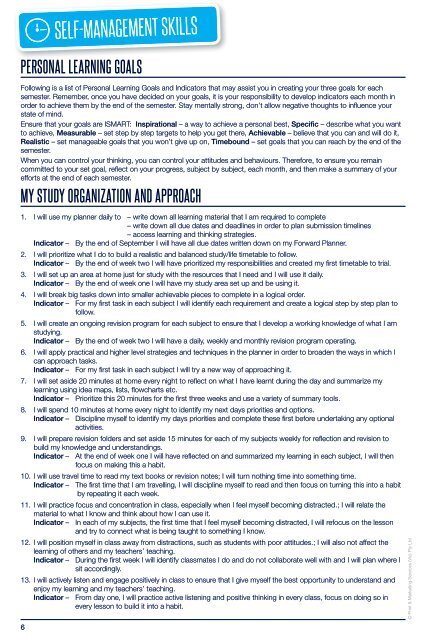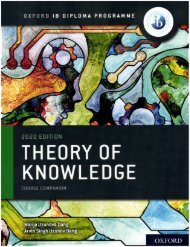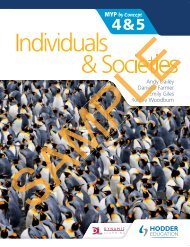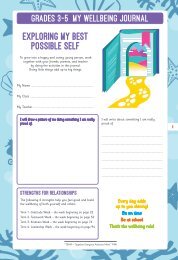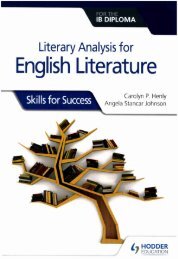2019-20 N. American Planner_DP Sample
You also want an ePaper? Increase the reach of your titles
YUMPU automatically turns print PDFs into web optimized ePapers that Google loves.
SELF-MANAGEMENT SKILLS<br />
PERSONAL LEARNING GOALS<br />
Following is a list of Personal Learning Goals and Indicators that may assist you in creating your three goals for each<br />
semester. Remember, once you have decided on your goals, it is your responsibility to develop indicators each month in<br />
order to achieve them by the end of the semester. Stay mentally strong, don’t allow negative thoughts to influence your<br />
state of mind.<br />
Ensure that your goals are ISMART: Inspirational – a way to achieve a personal best, Specific – describe what you want<br />
to achieve, Measurable – set step by step targets to help you get there, Achievable – believe that you can and will do it,<br />
Realistic – set manageable goals that you won’t give up on, Timebound – set goals that you can reach by the end of the<br />
semester.<br />
When you can control your thinking, you can control your attitudes and behaviours. Therefore, to ensure you remain<br />
committed to your set goal, reflect on your progress, subject by subject, each month, and then make a summary of your<br />
efforts at the end of each semester.<br />
MY STUDY ORGANIZATION AND APPROACH<br />
1. I will use my planner daily to – write down all learning material that I am required to complete<br />
– write down all due dates and deadlines in order to plan submission timelines<br />
– access learning and thinking strategies.<br />
Indicator – By the end of September I will have all due dates written down on my Forward <strong>Planner</strong>.<br />
2. I will prioritize what I do to build a realistic and balanced study/life timetable to follow.<br />
Indicator – By the end of week two I will have prioritized my responsibilities and created my first timetable to trial.<br />
3. I will set up an area at home just for study with the resources that I need and I will use it daily.<br />
Indicator – By the end of week one I will have my study area set up and be using it.<br />
4. I will break big tasks down into smaller achievable pieces to complete in a logical order.<br />
Indicator – For my first task in each subject I will identify each requirement and create a logical step by step plan to<br />
follow.<br />
5. I will create an ongoing revision program for each subject to ensure that I develop a working knowledge of what I am<br />
studying.<br />
Indicator – By the end of week two I will have a daily, weekly and monthly revision program operating.<br />
6. I will apply practical and higher level strategies and techniques in the planner in order to broaden the ways in which I<br />
can approach tasks.<br />
Indicator – For my first task in each subject I will try a new way of approaching it.<br />
7. I will set aside <strong>20</strong> minutes at home every night to reflect on what I have learnt during the day and summarize my<br />
learning using idea maps, lists, flowcharts etc.<br />
Indicator – Prioritize this <strong>20</strong> minutes for the first three weeks and use a variety of summary tools.<br />
8. I will spend 10 minutes at home every night to identify my next days priorities and options.<br />
Indicator – Discipline myself to identify my days priorities and complete these first before undertaking any optional<br />
activities.<br />
9. I will prepare revision folders and set aside 15 minutes for each of my subjects weekly for reflection and revision to<br />
build my knowledge and understandings.<br />
Indicator – At the end of week one I will have reflected on and summarized my learning in each subject, I will then<br />
focus on making this a habit.<br />
10. I will use travel time to read my text books or revision notes; I will turn nothing time into something time.<br />
Indicator – The first time that I am travelling, I will discipline myself to read and then focus on turning this into a habit<br />
by repeating it each week.<br />
11. I will practice focus and concentration in class, especially when I feel myself becoming distracted.; I will relate the<br />
material to what I know and think about how I can use it.<br />
Indicator – In each of my subjects, the first time that I feel myself becoming distracted, I will refocus on the lesson<br />
and try to connect what is being taught to something I know.<br />
12. I will position myself in class away from distractions, such as students with poor attitudes.; I will also not affect the<br />
learning of others and my teachers’ teaching.<br />
Indicator – During the first week I will identify classmates I do and do not collaborate well with and I will plan where I<br />
sit accordingly.<br />
13. I will actively listen and engage positively in class to ensure that I give myself the best opportunity to understand and<br />
enjoy my learning and my teachers’ teaching.<br />
Indicator – From day one, I will practice active listening and positive thinking in every class, focus on doing so in<br />
every lesson to build it into a habit.<br />
6<br />
© Print & Marketing Services (Vic) Pty Ltd<br />
<strong>20</strong>18/19 Intl <strong>Planner</strong>_<strong>DP</strong>_FRONT.indd 6 25/5/18 3:13 pm


